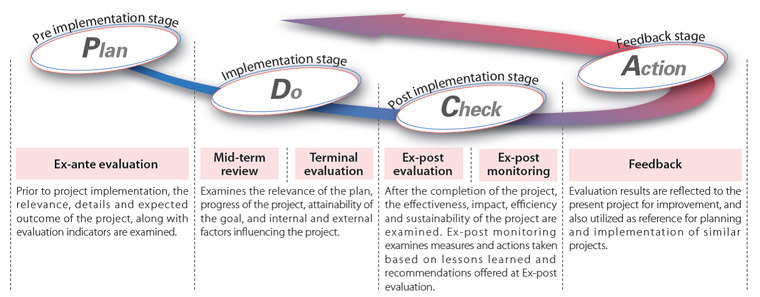In an effort to improve its projects and ensure accountability to the Japanese taxpayers, JICA implements project evaluations in accordance with the PDCA (Plan, Do, Check, and Action) cycle for all Technical Cooperation, ODA Loans, and Grant Aid projects.
The evaluation system of JICA has the five features.
(1) Consistent evaluation throughout the project’s PDCA cycle
(2) Coherent methodologies and criteria for three schemes of assistance
(3) Cross-sectoral and comprehensive evaluation through a thematic evaluation
(4) Ensuring objectivity and transparency
(5) Emphasizing use of evaluation results
(1) Consistent evaluation throughout the project's PDCA cycle
For all projects, JICA’s evaluation is conducted based on the PDCA cycle, regardless of the scheme of assistance*. Considering the characteristics of the scheme of assistance, such as the assistance period and timeframe for expected results, JICA conducts the evaluation within a consistent framework at each stage of the project (planning, implementation, post-implementation and feedback). By conducting the evaluation at each stage of the PDCA cycle, it aims to improve the development results of the project.

(2) Coherent methodologies and criteria for three schemes of assistance
JICA adopts an evaluation system that uses cross-sectoral methodologies and criteria applicable to all schemes of assistance. For Technical Cooperation, ODA Loans, and Grant Aid projects, respectively, JICA aims to conduct the evaluation and to utilize the findings based on a consistent philosophy and a standard evaluation framework, while taking into consideration the differences in characteristics among each assistance scheme.
Specifically, an evaluation framework that reflects:
- 1 . Project level evaluation based on the PDCA cycle.
- 2 . Evaluation applying the Six DAC Criteria for evaluating development assistance that is laid out by the OECD-DAC (Organization for Economic Co-operation and Development/ Development Assistance Committee) and is internationally accepted as an ODA evaluation method .
- 3 . Publication of evaluation results based on a uniform style using a rating system developed by JICA.
Table 1: Evaluation Perspectives Using the Six DAC Criteria for Evaluating Development Assistance
| Relevance |
|
|---|---|
| Coherence |
|
| Effectiveness |
|
| Impact |
|
| Efficiency |
|
| Sustainability |
|
(3) Cross-sectoral and comprehensive evaluation through a thematic evaluation
JICA conducts thematic evaluations to analyze a group of projects comprehensively and cross-sectorally. The aim of this evaluation is to derive recommendations and lessons learned which can be utilized across projects. Thematic evaluation is conducted by selecting projects based on a specified theme and analyzing them from a different angle than in an individual project evaluation.
(4) Ensuring objectivity and transparency
JICA has incorporated external evaluations according to project size in the ex-post evaluations which require an objective verification of project implementation results for all three schemes of assistance, and the findings are made available on the JICA website. JICA will continue its efforts for increasing objectivity and transparency in its project evaluations.
(5) Emphasizing use of evaluation results
JICA's project evaluations are not merely evaluations. Evaluation results also serve as a feedback function for improving the quality of the "Action" phase of the PDCA cycle. This feedback is utilized as recommendations for improving the project and lessons learned for ongoing and future similar projects. JICA intends to further strengthen the feedback function for reflecting the evaluation results into JICA's fundamental strategies for cooperation and the JICA Thematic Guidelines.
At the same time, JICA makes efforts to reflect the evaluation results into development policies, sector programs, and respective projects of the recipient governments by feeding back the evaluation findings. Conducting joint evaluations with the recipient government is also a way of feeding back the evaluation findings.




scroll